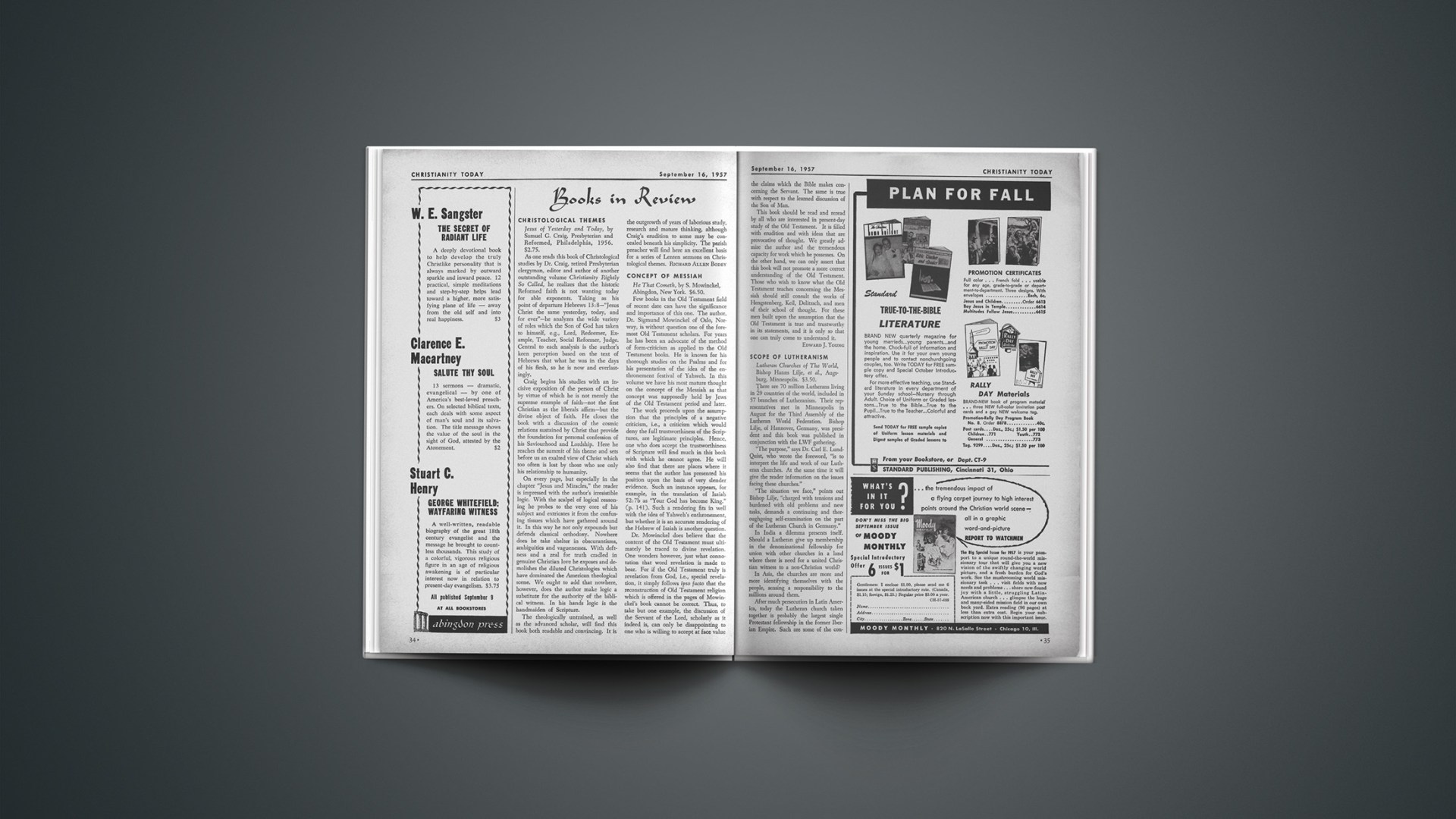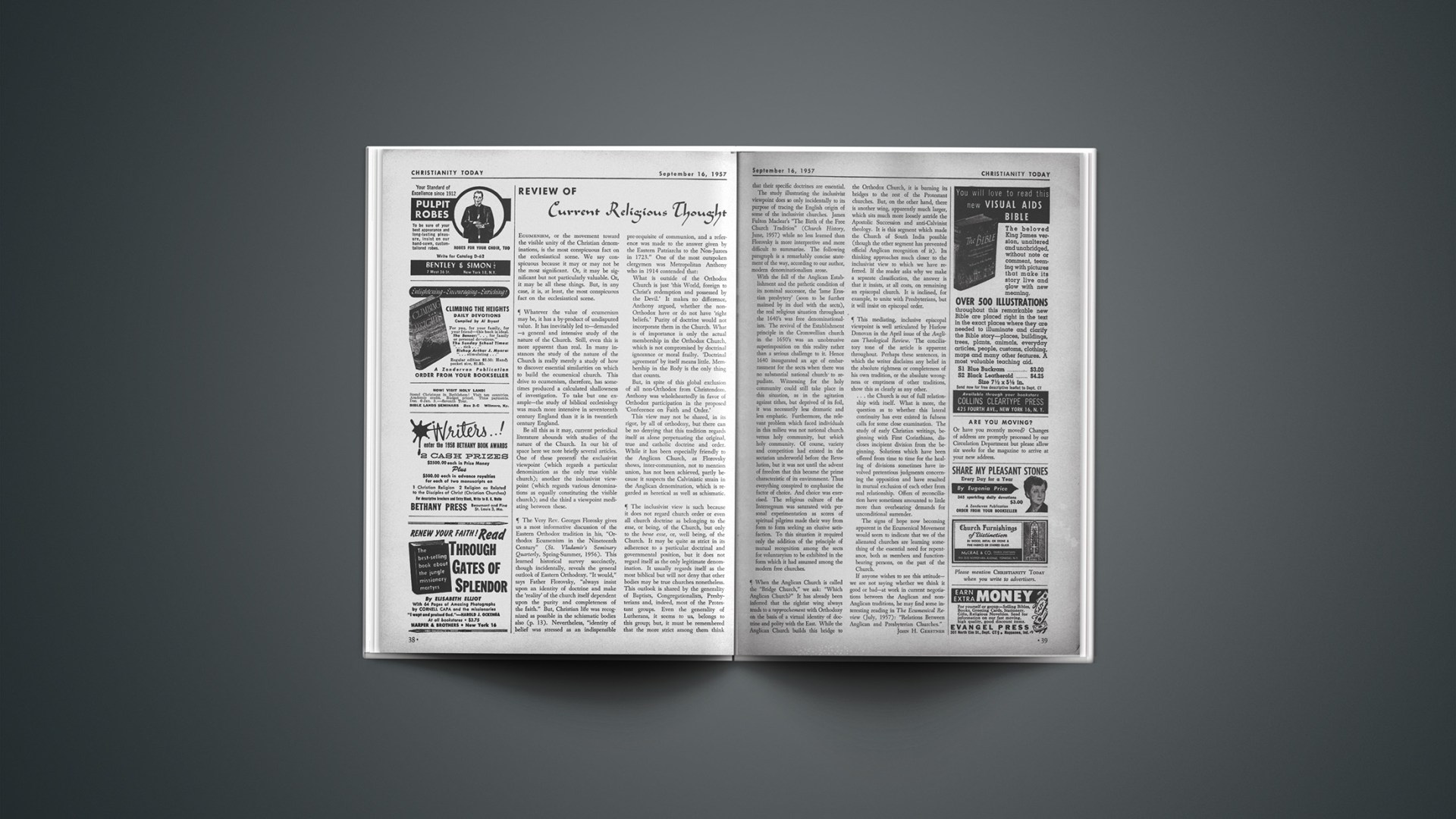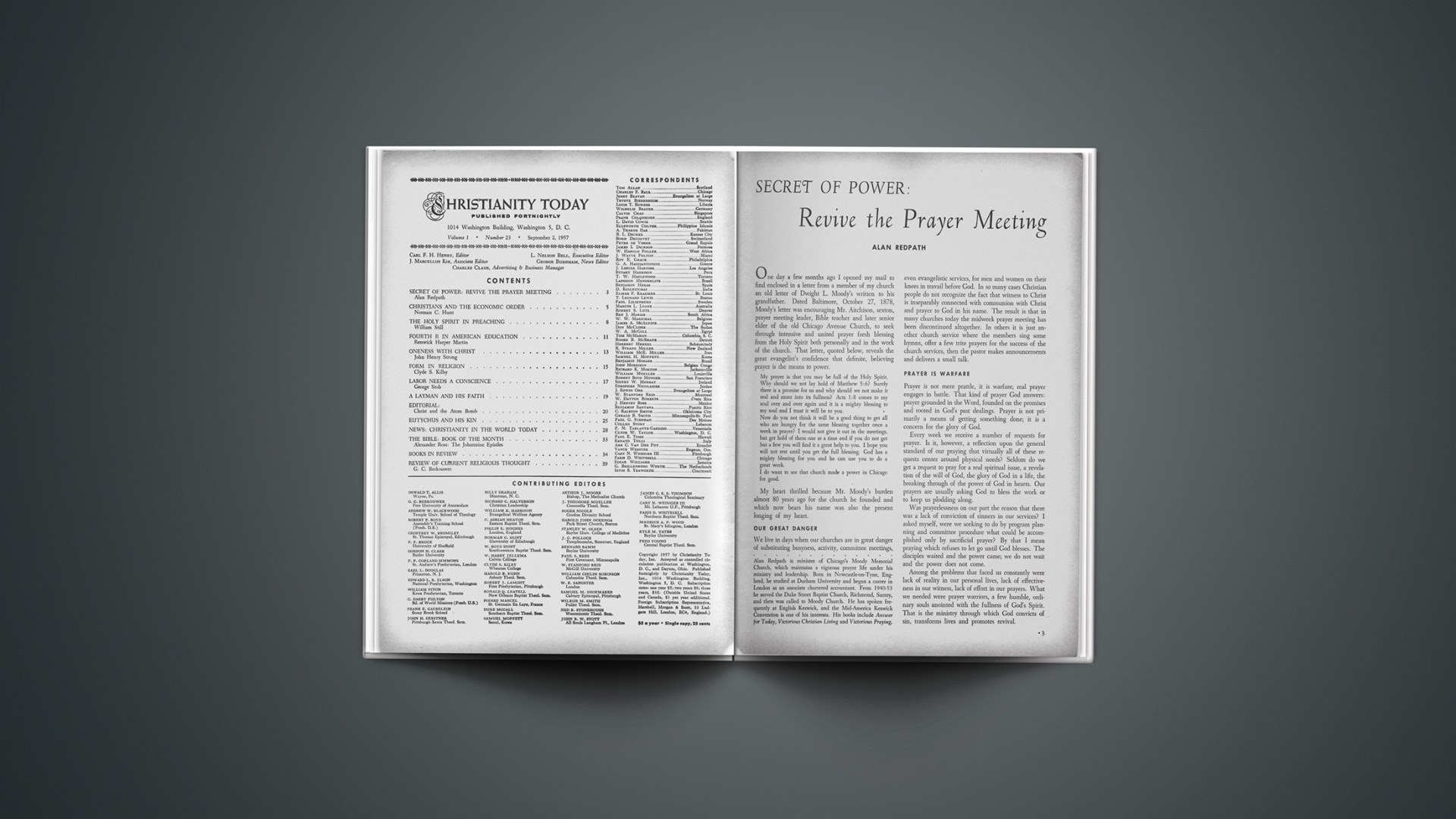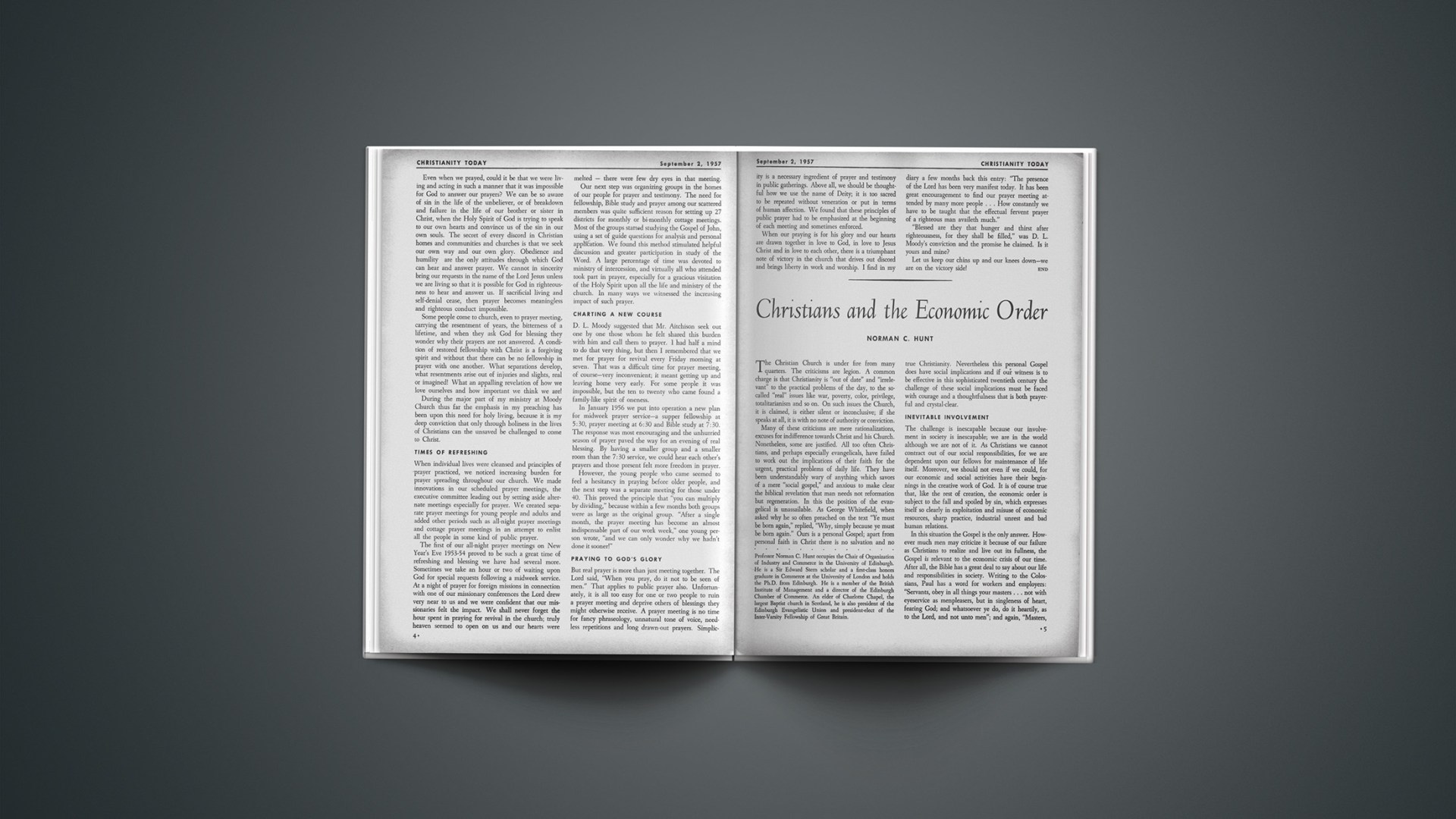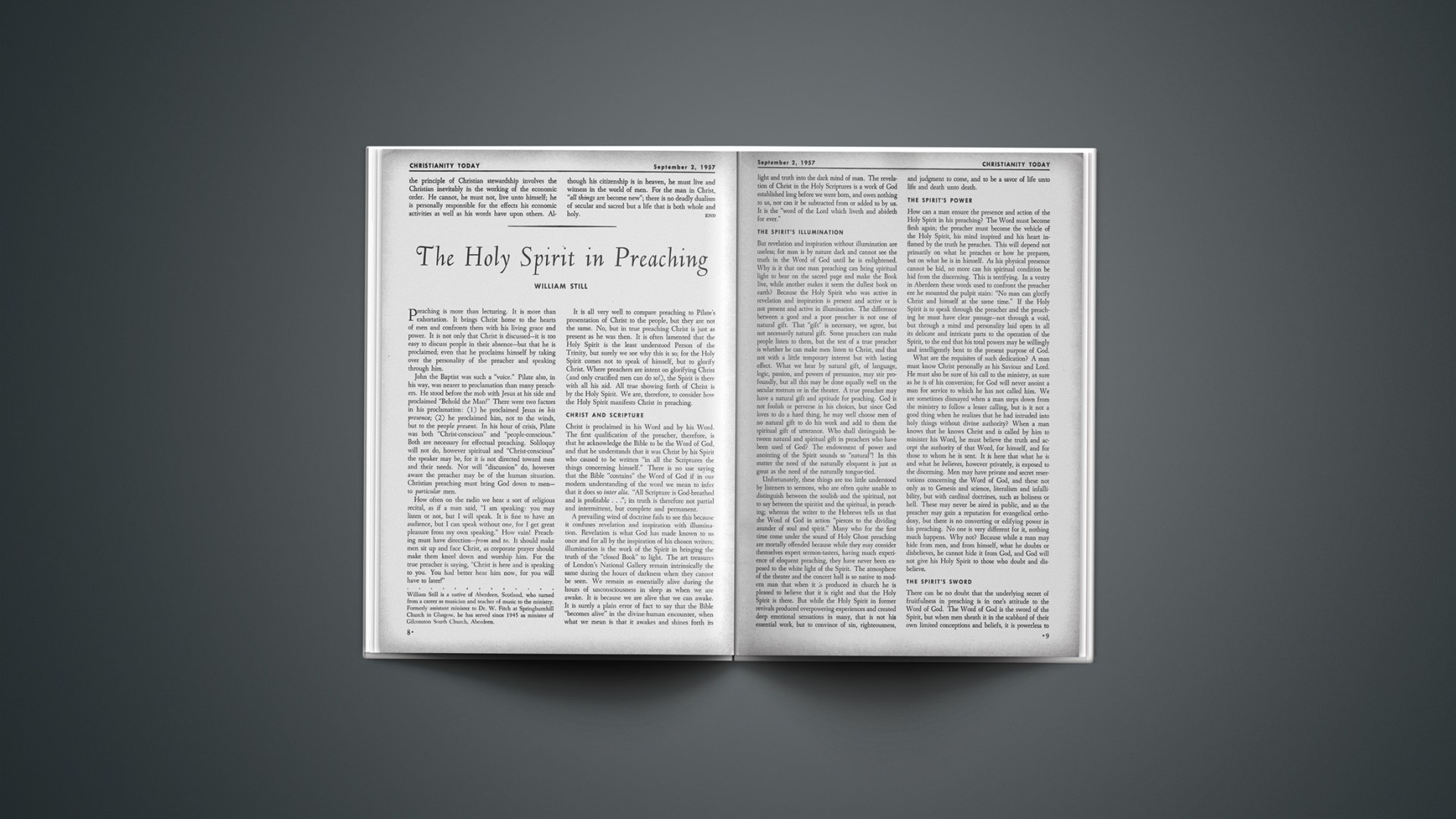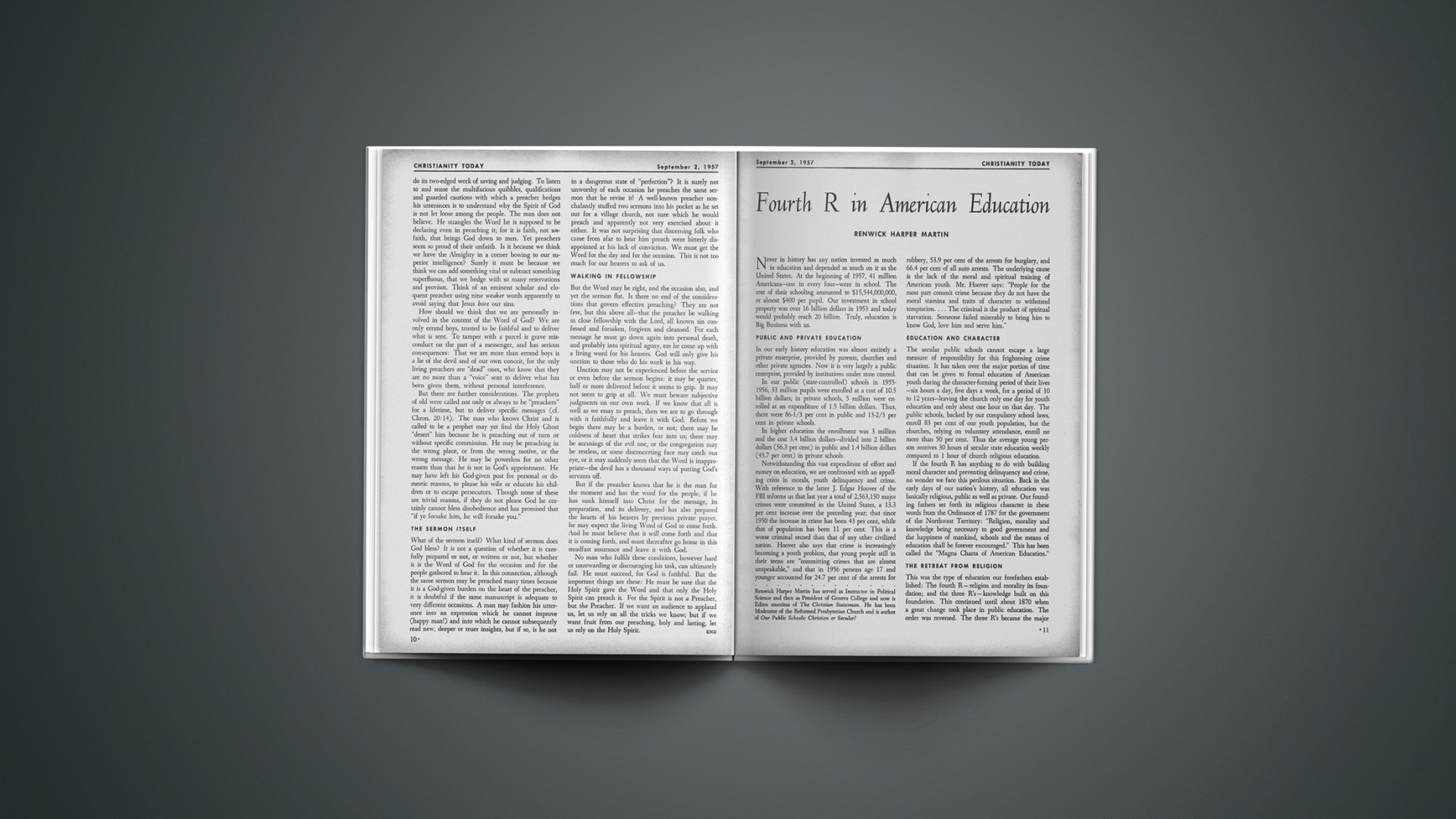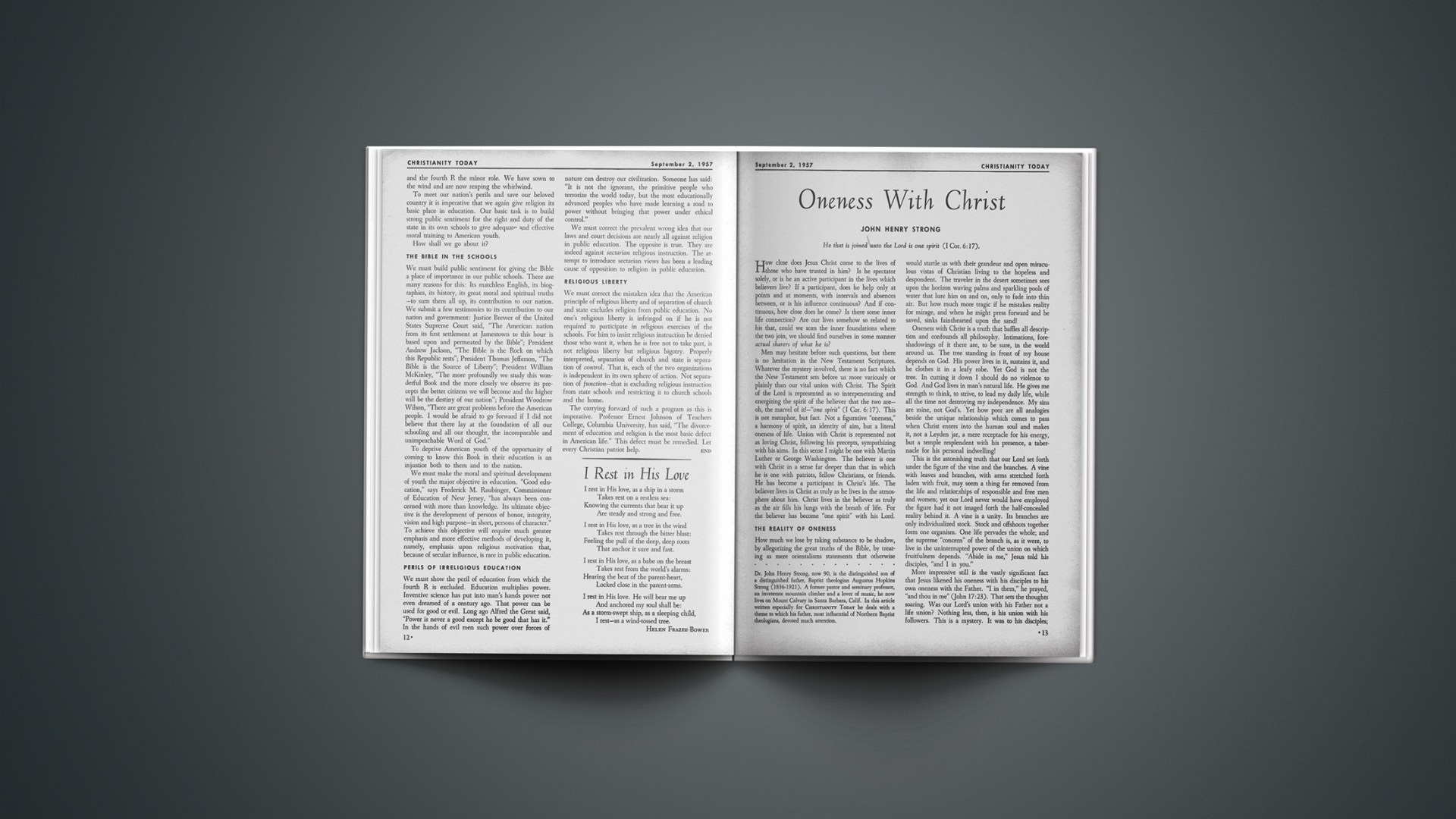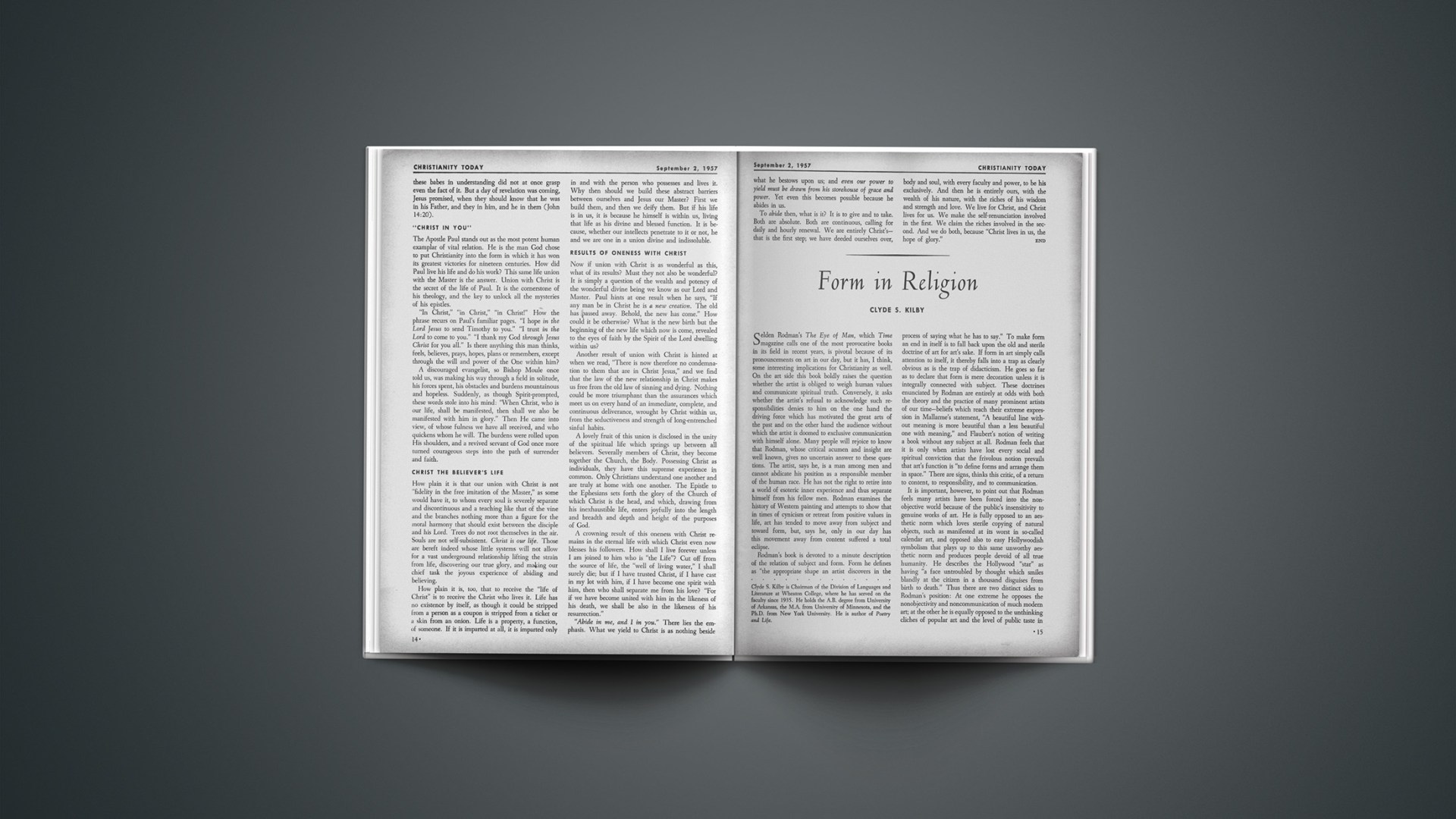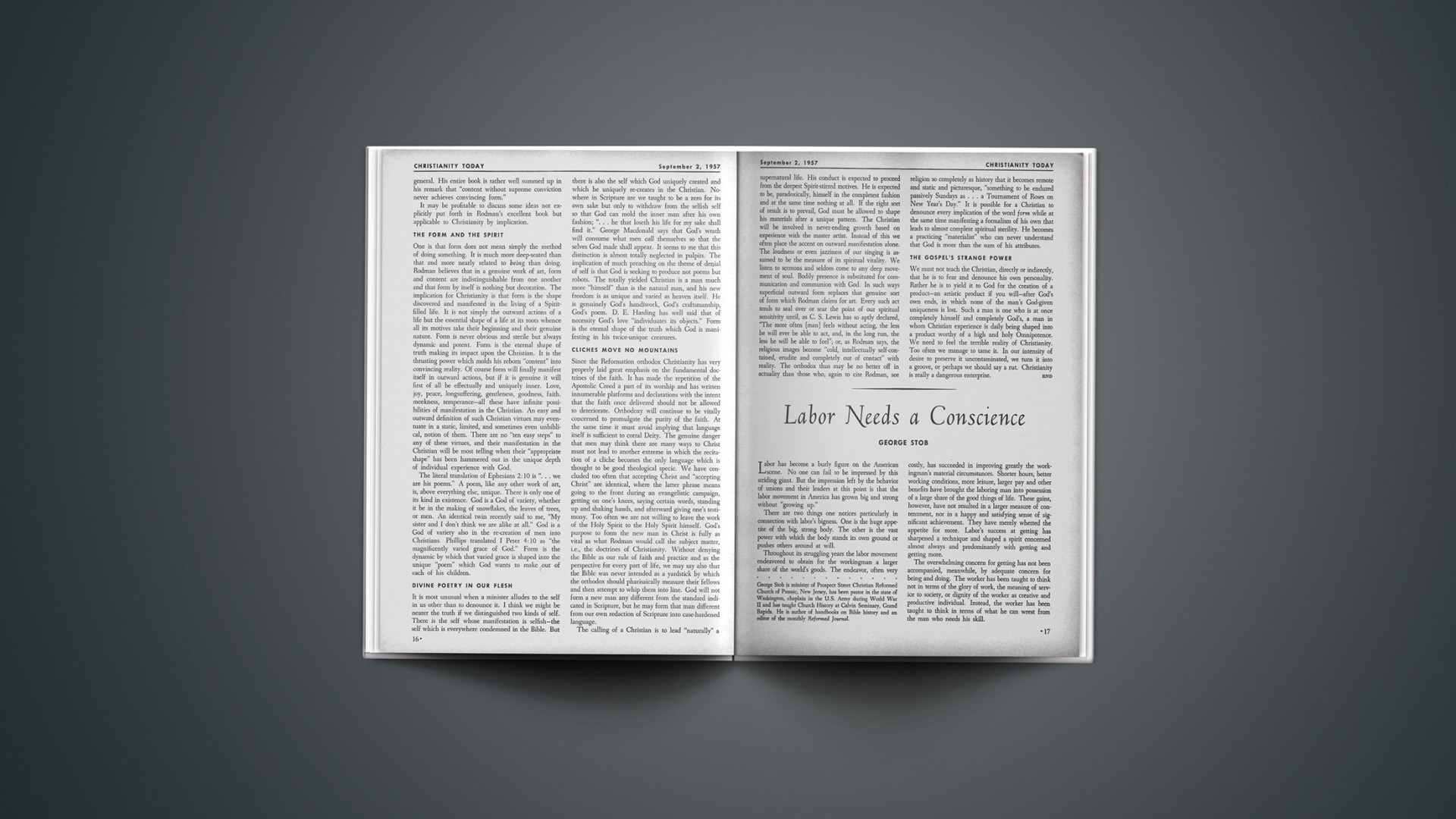Christological Themes
Jesus of Yesterday and Today, by Samuel G. Craig, Presbyterian and Reformed, Philadelphia, 1956. $2.75.
As one reads this book of Christological studies by Dr. Craig, retired Presbyterian clergyman, editor and author of another outstanding volume Christianity Rightly So Called, he realizes that the historic Reformed faith is not wanting today for able exponents. Taking as his point of departure Hebrews 13:8—“Jesus Christ the same yesterday, today, and for ever”—he analyzes the wide variety of roles which the Son of God has taken to himself, e.g., Lord, Redeemer, Example, Teacher, Social Reformer, Judge. Central to each analysis is the author’s keen perception based on the text of Hebrews that what he was in the days of his flesh, so he is now and everlastingly.
Craig begins his studies with an incisive exposition of the person of Christ by virtue of which he is not merely the supreme example of faith—not the first Christian as the liberals affirm—but the divine object of faith. He closes the book with a discussion of the cosmic relations sustained by Christ that provide the foundation for personal confession of his Saviourhood and Lordship. Here he reaches the summit of his theme and sets before us an exalted view of Christ which too often is lost by those who see only his relationship to humanity.
On every page, but especially in the chapter “Jesus and Miracles,” the reader is impressed with the author’s irresistible logic. With the scalpel of logical reasoning he probes to the very core of his subject and extricates it from the confusing tissues which have gathered around it. In this way he not only expounds but defends classical orthodoxy. Nowhere does he take shelter in obscurantisms, ambiguities and vaguenesses. With deftness and a zeal for truth cradled in genuine Christian love he exposes and demolishes the diluted Christologies which have dominated the American theological scene. We ought to add that nowhere, however, does the author make logic a substitute for the authority of the biblical witness. In his hands logic is the handmaiden of Scripture.
The theologically untrained, as well as the advanced scholar, will find this book both readable and convincing. It is the outgrowth of years of laborious study, research and mature thinking, although Craig’s erudition to some may be concealed beneath his simplicity. The parish preacher will find here an excellent basis for a series of Lenten sermons on Christological themes.
RICHARD ALLEN BODEY
Concept Of Messiah
He That Cometh, by S. Mowinckel, Abingdon, New York. $6.50.
Few books in the Old Testament field of recent date can have the significance and importance of this one. The author, Dr. Sigmund Mowinckel of Oslo, Norway, is without question one of the foremost Old Testament scholars. For years he has been an advocate of the method of form-criticism as applied to the Old Testament books. He is known for his thorough studies on the Psalms and for his presentation of the idea of the enthronement festival of Yahweh. In this volume we have his most mature thought on the concept of the Messiah as that concept was supposedly held by Jews of the Old Testament period and later.
The work proceeds upon the assumption that the principles of a negative criticism, i.e., a criticism which would deny the full trustworthiness of the Scriptures, are legitimate principles. Hence, one who does accept the trustworthiness of Scripture will find much in this book with which he cannot agree. He will also find that there are places where it seems that the author has presented his position upon the basis of very slender evidence. Such an instance appears, for example, in the translation of Isaiah 52:7b as “Your God has become King.” (p. 141). Such a rendering fits in well with the idea of Yahweh’s enthronement, but whether it is an accurate rendering of the Hebrew of Isaiah is another question.
Dr. Mowinckel does believe that the content of the Old Testament must ultimately be traced to divine revelation. One wonders however, just what connotation that word revelation is made to bear. For if the Old Testament truly is revelation from God, i.e., special revelation, it simply follows ipso facto that the reconstruction of Old Testament religion which is offered in the pages of Mowinckel’s book cannot be correct. Thus, to take but one example, the discussion of the Servant of the Lord, scholarly as it indeed is, can only be disappointing to one who is willing to accept at face value the claims which the Bible makes concerning the Servant. The same is true with respect to the learned discussion of the Son of Man.
This book should he read and reread by all who are interested in present-day study of the Old Testament. It is filled with erudition and with ideas that are provocative of thought. We greatly admire the author and the tremendous capacity for work which he possesses. On the other hand, we can only assert that this hook will not promote a more correct understanding of the Old Testament. Those who wish to know what the Old Testament teaches concerning the Messiah should still consult the works of Hengstenberg, Keil, Delitzsch, and men of their school of thought. For these men built upon the assumption that the Old Testament is true and trustworthy in its statements, and it is only so that one can truly come to understand it.
EDWARD J. YOUNG
Scope Of Lutheranism
Lutheran Churches of The World, Bishop Hanns Lilje, et al., Augsburg, Minneapolis. $3.50.
There are 70 million Lutherans living in 29 countries of the world, included in 57 branches of Lutheranism. Their representatives met in Minneapolis in August for the Third Assembly of the Lutheran World Federation. Bishop Lilje, of Hannover, Germany, was president and this book was published in conjunction with the LWF gathering.
“The purpose,” says Dr. Carl E. Lund-Quist, who wrote the foreword, “is to interpret the life and work of our Lutheran churches. At the same time it will give the reader information on the issues facing these churches.”
“The situation we face,” points out Bishop Lilje, “charged with tensions and burdened with old problems and new tasks, demands a continuing and thoroughgoing self-examination on the part of the Lutheran Church in Germany.”
In India a dilemma presents itself. Should a Lutheran give up membership in the denominational fellowship for union with other churches in a land where there is need for a united Christian witness to a non-Christian world?
In Asia, the churches are more and more identifying themselves with the people, sensing a responsibility to the millions around them.
After much persecution in Latin America, today the Lutheran church taken together is probably the largest single Protestant fellowship in the former Iberian Empire. Such are some of the conclusions of sections of the book dealing with geographical areas of Europe, the Scandinavian countries, Africa, Asia, North America and Latin America.
Bishop Lilje, Pastor Laszlo G. Terray, Dr. Ragnar Askmark, Dr. Theodore Bachmann, Bishop Rajah B. Manikam, Dr. Fridtjov Birkeli and Dr. Stewart Harman are authors of various chapters.
A hopeful prospect is expressed concerning theological discussions regarding Christian unity which may be the outcome of the LWF meetings in Minneapolis. Pointing out how Lutherans in North America not only have learned how to adapt themselves to survive, but now are learning to lead, Dr. Bachmann says, “Lutherans today are thus obligated to re-examine their relations (1) to other Christians, and (2) to each other in the light of their own heritage.”
With mergers being talked by numbers of Lutherans, such a volume adds substantially to available material to help in understanding these groups and for what they stand. The book will serve both as a means of orienting the general reader concerning Lutheranism’s scope and as a reference concerning organizations and leaders in the branches of the Lutheran Church.
RICHARD L. JAMES
Christian Moralism
Christian Faith In Action, Foy Valentine, Ed., Broadman, Nashville. $2.00.
This is a book of 14 sermons on subjects dealing with ethical requirements of Christianity as applied to significant areas of everyday living, written by prominent clergymen in the Southern Baptist church. This volume was prepared “in the conviction that the Christian faith is practical, that God is concerned about the great moral issues with which Christians daily grapple, and that Jesus does have a message for our day in these significant areas.”
The first sermon, by Dr. J. B. Weatherspoon, provides a setting and finds a basis for moral concern in the Christian profession of the Lordship of Jesus Christ. The confession of Jesus’ Lordship “is not just a statement of faith, a theological creed; it contains a moral challenge.… For one to say … that Jesus is Lord is to face a moral obligation to obey him, which cannot be refused without betraying the faith.” Subsequent sermons are a discussion of the problems of civic duty, honesty, materialism, sex, love and marriage, divorce, alcoholism, race, pride, segregation, daily work, juvenile delinquency and freedom. The volume concludes with a sermon which offers the readers “a charter for Christian living.”
These sermons are an attempt to set forth a statement of a Christian ethic on the basis of a conservative, evangelical theology, and are written in the consciousness that only too often evangelical Christians have failed adequately “to proclaim … the moral and social responsibilities of the new life.” If one wonders how these Southern preachers would treat the subject of race and segregation, he will find they have taken seriously their concern to speak the Christian faith to the issues of the day and are keenly and penitently aware of the sinfulness that lies at the basis of race discrimination. Commenting on the traditional Baptist struggle for freedom and their mighty confession that “all men have equal rights,” Dr. Marney expresses concern about “our common practice—‘some white men have equal rights.’ ” Biology and theology have been employed to resolve this contradiction. “But,” says Dr. Marney, “here in the South we Christians used a butchered biology to bolster a biased theology, and it threatens to destroy not only our major principle of equality, but our very personality as a people of God.” Again, “the tensions of Asia and Africa spill over into our countyseat towns, our school boards, our deacons’ meetings, our coffee houses.” It is needful to repent, and return to “the belief that in our Lord Christ’s name men are really men, ends in themselves, never means to an end.”
The sermons are not strictly textual, but are for the most part tracts for the day, but written from the viewpoint of the Christian faith. The call to a Christian ethic, because it is the demand of the Lordship of Jesus, and the requirement of a right relationship to Jesus Christ, is a necessary call. One might have wished that the volume had touched more fully and deeply on the meaning of union with Christ in his cross and resurrection for Christian living. If that were done it would have relieved the messages of what appears to be a simple Christian moralism, i.e., a statement of the problem of Christian living in terms of knowledge of and courage to do the right. But to live a Christian life one needs more than enlightenment and courage. One must become a new creature in Christ, by dying and rising again with him. Christian living involves the anguish of self-crucifixion and the profound dynamic of a life caught up in the risen Christ. And Baptists certainly do know the meaning of being buried with Christ and rising with him to newness to life.
GEORGE STOB
Religious Poetry
Garment of Praise, by Helen Frazee-Bower, Humphries, Boston. $2.75. Above the Thorn, by Johnstone G. Patrick, Pageant, New York. $2.50. Rhythm and Rhyme, by B. B. and Ella Allen Edmiaston, Stamps-Baxter, Chattanooga, Tenn. $1.25.
The most obvious fact about the poems of Helen Frazee-Bower is their overwhelming homage to Christ as Saviour and Lord. The book is divided into fourteen parts with such titles as “Praise,” “Bereavement,” “Motherhood,” “Easter,” and “Second Coming,” but Christ is paramount in all of them. What is unusual in such books is the fact that the sonnet form is used in nearly half the poems. The sonnet is too intricate for most religious versifiers, but Mrs. Frazee-Bower has used it with skill. There are phrases here and there showing her acquaintance with such masters as Tennyson and Browning and reflecting her conceptions of what poetry ought to be. With some exceptions she shows a sensitivity to penetrating language and seldom falls into the trite phrase. Sometimes she is too facile with rhythms and rhymes. In recent years Mrs. Frazee-Bower has suffered an accident which left her as invalid, and some of the poems give testimony to her faith in this severe testing.
Johnstone G. Patrick is a Scotchman who is now pastor of the First Presbyterian Church of Sayre, Pennsylvania. His poems have appeared in such publications as Christian Century, Canadian Poetry Magazine and the British Weekly. His best poems have a crisp, staccato quality which permeates sense as well as sound. He often demonstrates the oblique approach which constitutes genuine poetry. For instance, in “The Lodestar” the cock of Peter’s denial is heard crowing in the manger and the Magi’s star moves over Calvary as well as over the stable. His allusions to nature are appreciative without being sentimental. One section of the book consists of prayer poems, and “Prayer for Peace” illustrates Mr. Patrick’s incisive thought:
Attack me, Father, now,
As when the sea
Rushes the rising rocks
Relentlessly;
Then, with the easing done,
Gather increase,
Circle my stubborn soul,
Lap it in peace.
Considerably less can be said for the third book, which has perhaps three times as many verses as the other two, but verses which are chiefly noteworthy for triteness of phrase, rhyme and rhythm. Many of them belong to the class of writing which assumes that turning the Bible into rhyme constitutes poetry. Phrases like “wings of the morning,” “zephyrs in gentleness,” “helped a sick soul to grow strong,” “a song came winging its way,” and “greet life with a song” show the general quality, or rather lack of it. As with many such privately printed volumes, the printing and proofreading are poor. The best thing about this little book is not what is in it but what it suggests about the authors as wholesome, enthusiastic and pleasant people.
However difficult it is to make a book of verse pay for itself these days, it would nevertheless be better if authors and publishers refrained from recommending their verses as fitting for use on “occasions,” a practice which inevitably cheapens the true poetic value. It would be well also if publishers avoided such sweeping and false generalizations as the one on the dust cover of Above the Thorn: “This slender volume … may be the precursor of a veritable renaissance of religious poetry,” as if a renaissance of religious poetry had not been under way for twenty years.
CLYDE S. KILBY
Impact Impaired
Discoveries Made from Living My New Life, by Eugenia Price, Zondervan, Grand Rapids. $2.00.
Eugenia Price, radio script writer and former producer of the program “Unshackled,” shares in this book experiences and thoughts out of her brief years as a Christian.
Under the headings of “Discoveries Concerning Discipleship, My Reason for Living, and Concerning a Number of Wonder-filled Things,” she gives her testimony to the love and faithfulness of God. Certain verses form a kind of refrain through the book: “Go and make disciples of men,” “To me to live is Christ,” “Learn of me,” etc.
The book is a challenge to the Christian to live in closer relationship with his Lord. It should prove a blessing to the reader who will apply its suggestion to his life.
Miss Price gives evidence of being of mystical bent, with little time for “theology.” Perhaps when she has had longer experience in the Christian life and has had time to see the dismaying results of the disparagement of theology, she will modify her view.
“If for some reason Jesus Christ came to me and said that he had made a big mistake, that there was no eternal reward, and no heaven and no hell—would I still follow Him?” (p. 111). This reminds me of the words attributed to a certain liberal who claimed that Christianity would be valid even if it could be proved that Jesus had never lived! We cannot but register our horror! A Christ who could make “mistakes” would not be able to save us. He would not be God. A Bible that contained “mistakes” would not be the infallible Scripture of orthodox Christianity.
It is unfortunate that tendencies such as these weaken the impact of a book which would otherwise be an even more appealing testimony.
NORMA R. ELLIS
Pragmatism Applied
John Dewey’s Thought and Its Implications For Christian Education, by Manford George Gutzke, King’s Crown Press, New York, 1956. $3.80.
The problem which the author confronts in this study is whether the Christian Gospel can be presented to the modern mind in harmony with the method of science. His basic thesis is that, “when experimental analysis and interpretation are applied in the exposition of religious experience there will be neither reduction nor impairment of the values cherished by men, but rather enlargement and improvement of such values to the general advantage and benefit of all concerned” (pp. 228–229).
The writer is obviously well acquainted with the philosophy of John Dewey. He quotes extensively. Whether he interprets Dewey’s statements accurately in all instances may be open to question.
After discussing the operation of intelligence, the nature of man, the meaning of religion, and instrumentation in religious experience, he comes out with the following conclusions:
Since religion is a part of experience it is subject to the method of critical intelligence. Through the method of science one is able to study antecedent causes and results. Having identified these instrumentalities, one may use the method of critical intelligence to improve both instrumentalities and results. These improved instrumentalities are not to be held with finality but are subject to constant revision. Finally, as in Dewey’s philosophy so in religion, these effective instrumentalities must lead to action that will benefit the total experience of mankind.
The findings of this book are neither startling nor unusual and it is most difficult to read.
FINDLEY B. EDGE

